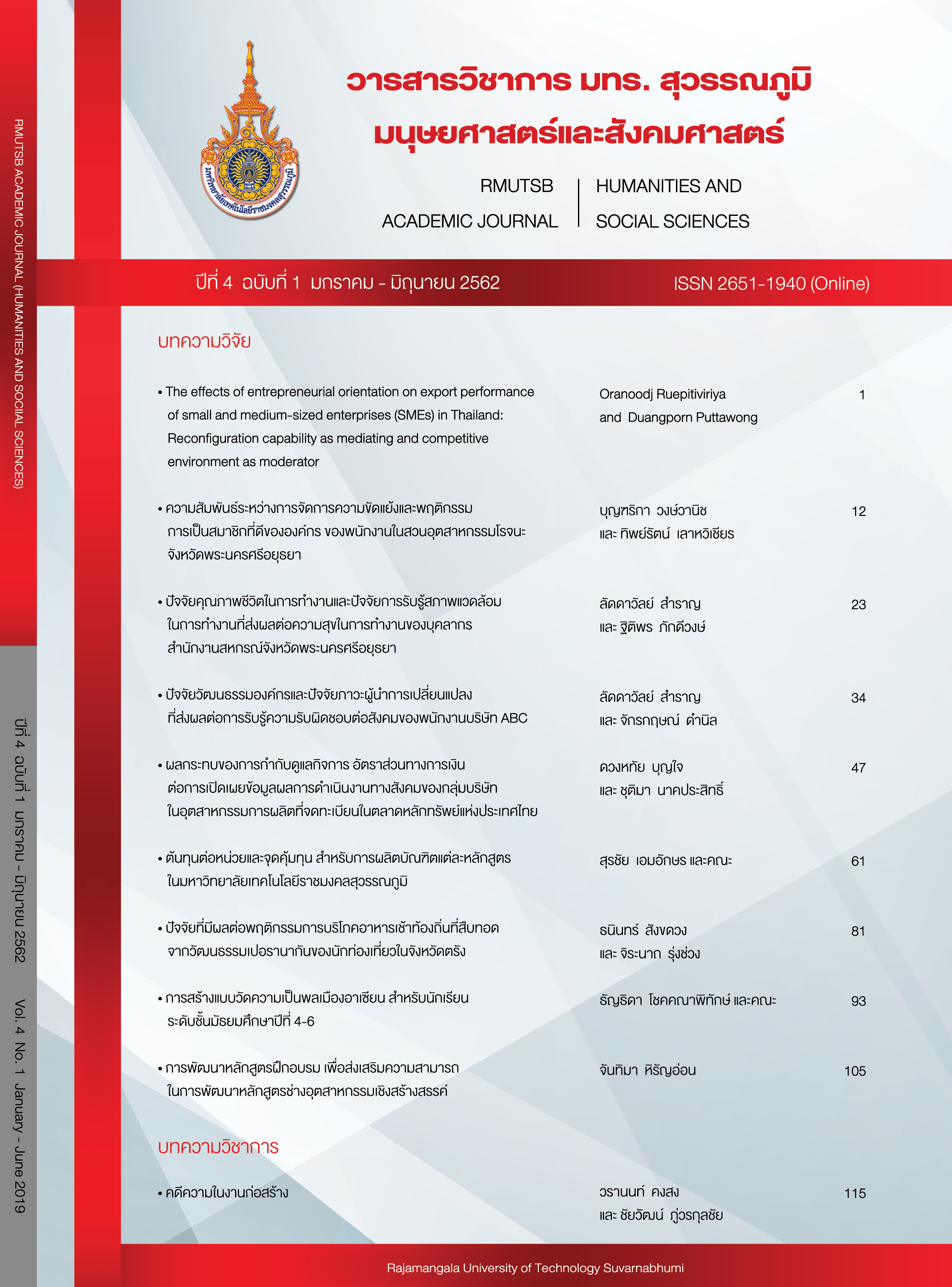The effects of entrepreneurial orientation on export performance of small and medium-sized enterprises (SMEs) in Thailand: Reconfiguration capability as mediating and competitive environment as moderator
Main Article Content
Abstract
The purpose of this paper is to analyze the causal relationship model of the effects of entrepreneurial orientation (EO) on export performance of small and medium-sized enterprises (SMEs) in Thailand with reconfiguration capability as mediating and competitive environment as moderator. A conceptual framework has been developed based on the literature reviews and research gaps of the earlier studies. The empirical study has been conducted with a population of entrepreneurs of SME exporters in Thailand who are the members of Department of International Trade Promotion with a registered capital of no more than 100 million Thai Baht. There are 238 SME exporters selected in this study. The research tool is a questionnaire collected by mail and completed face-to-face. The data is analyzed using descriptive and structural model analysis. The results show that the EO has no direct effect on the export performance (β=0.06, p=0.43). However, EO shows an indirect relationship between the variance of the export performance through reconfiguration capability as mediating variable. The results also show indirect path that mediating by reconfiguration capability from EO to export performance (β=0.90, p<0.01) and EO (β=0.12, p<0.05) has a direct effect on export performance which increases with favorable competitive environment as the moderator variable respectively.
Article Details
References
Ambrosini, V., Bowman, C., & Collier, N. (2009). Dynamic capabilities: an exploration of how firms renew their resource base. British Journal of Management, 20, S9-S24.
Anderson, A. R. (2000). The protean entrepreneur: the entrepreneurial process as fitting self and circumstance. Journal of Enterprising Culture, 8(03), 201-234.
Bontis, N., Bart, C., Tovstiga, G., & Tulugurova, E. (2009). Intellectual capital practices: a four-region comparative study. Journal of intellectual capital, 10(1), 70-80.
Covin, J. G., & Slevin, D. P. (1991). A conceptual model of entrepreneurship as firm behavior. Entrepreneurship theory and practice, 16(1), 7-25.
Dalli, D. (1995). The organization of exporting activities: relationships between internal and external arrangements. Journal of Business Research, 34(2), 107-115.
Frese, M., & de Kruif, M. (2000). Psychological success factors of entrepreneurship in Africa, a selective literature review. In M. Frese (Ed.), Success and failure of microbusiness owners in Africa: A psychological approach. London: Quorum Books.
Ireland, R. D., Hitt, M. A., & Sirmon, D. G. (2003). A model of strategic entrepreneurship: The construct and its dimensions. Journal of Management, 29(6), 963-989.
Jantunen, A., Puumalainen, K., Saarenketo, S., & Kyläheiko, K. (2005). Entrepreneurial orientation, dynamic capabilities and international performance. Journal of International Entrepreneurship, 3(3), 223-243.
Jiao, H., Wei, J., & Cui, Y. (2010). An empirical study on paths to develop dynamic capabilities: From the perspectives of entrepreneurial orientation and organizational learning. Frontiers of Business Research in China, 4(1), 47-72.
Kogut, B., & Chang, S. J. (1996). Platform investments and volatile exchange rates: Direct investment in the US by Japanese electronic companies. The Review of Economics and Statistics, 78(2), 221-231.
Krauss, S. I., Frese, M., Friedrich, C., & Unger, J. M. (2005). Entrepreneurial orientation: A psychological model of success among southern African small business owners. European Journal of Work and Organizational Psychology, 14(3), 315-344.
Kuhn, B., Sassmannshausen, S., & Zolin, R. (2010). “Entrepreneurial management” as a strategic choice in firm behavior: linking it with performance. In A. Groen, R. Oakey, & P. van der Sijde, (Eds.), Proceedings of the high technology small firms conference (HTSF) 2010. The Netherlands: University of Twente.
Kuratko, D. F. (2009). Introduction to entrepreneurship. Australia and UK: South-Western Cengage Learning.
Lumpkin, G. T., & Dess, G. G. (1996). Clarifying the entrepreneurial orientation construct and linking it to performance. Academy of management Review, 21(1), 135-172.
Miller, D. (1983). The correlates of entrepreneurship in three types of firms. Management science, 29(7), 770-791.
Miller, K. D., & Bromiley, P. (1990). Strategic risk and corporate performance: An analysis of alternative risk measures. Academy of Management journal, 33(4), 756-779.
OECD. (2000). OECD annual report 2000. Paris: OECD Publishing.
Porter, M. E. (1990). The competitive advantage of notions. Harvard business review, 68(2), 73-93.
Prahalad, C. K., & Hamel, G. (1990). The core competence of the corporation. Harvard Business Review, 68, 79.
Rauch, A., Wiklund, J., Lumpkin, G. T., & Frese, M. (2009). Entrepreneurial orientation and business performance: An assessment of past research and suggestions for the future. Entrepreneurship theory and practice, 33(3), 761-787.
Root, F. R. (1994). Entry strategies for international markets. New York: Lexington books.
Wiklund, J. (1999). The sustainability of the entrepreneurial orientation-performance relationship. Entrepreneurship Theory and Practice, 24(1), 37-48.
Wiklund, J., & Shepherd, D. (2003). Knowledge‐based resources, entrepreneurial orientation, and the performance of small and medium‐sized businesses. Strategic management journal, 24(13), 1307-1314.
Wu, L. Y. (2006). Resources, dynamic capabilities and performance in a dynamic environment: perceptions in Taiwanese IT enterprises. Information & Management, 43(4), 447-454.
Zahra, S. A. (1991). Predictors and financial outcomes of corporate entrepreneurship: An exploratory study. Journal of business venturing, 6(4), 259-285.
Zahra, S. A., & Covin, J. G. (1995). Contextual influences on the corporate entrepreneurship-performance relationship: A longitudinal analysis. Journal of business venturing, 10(1), 43-58.


